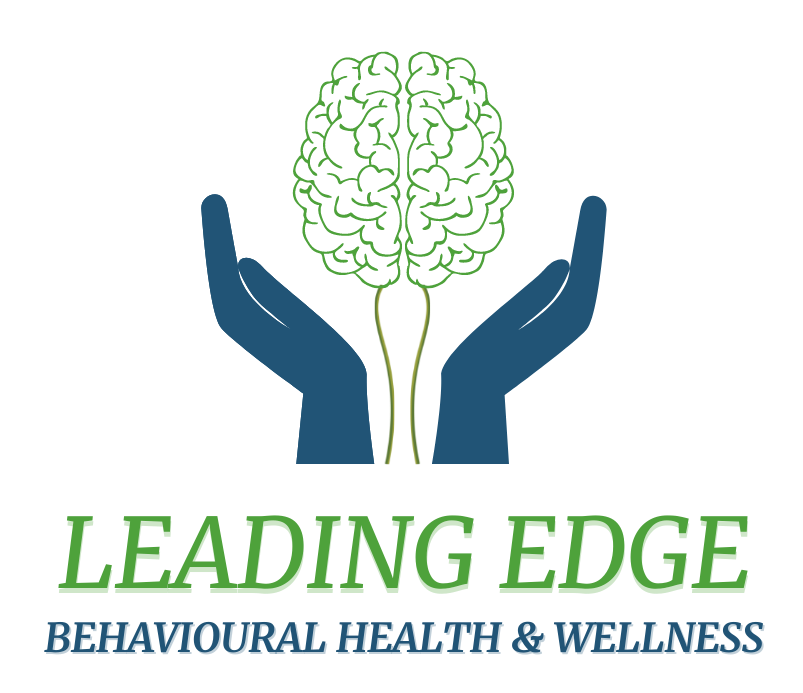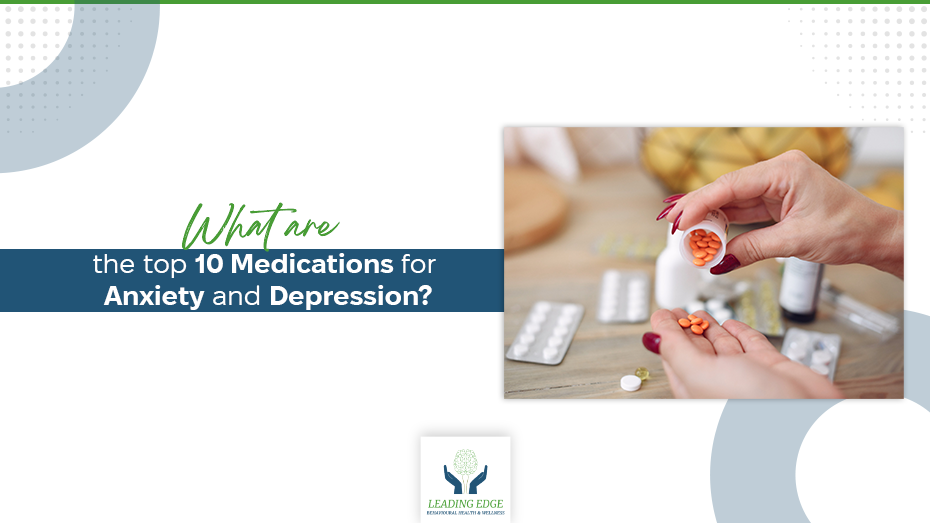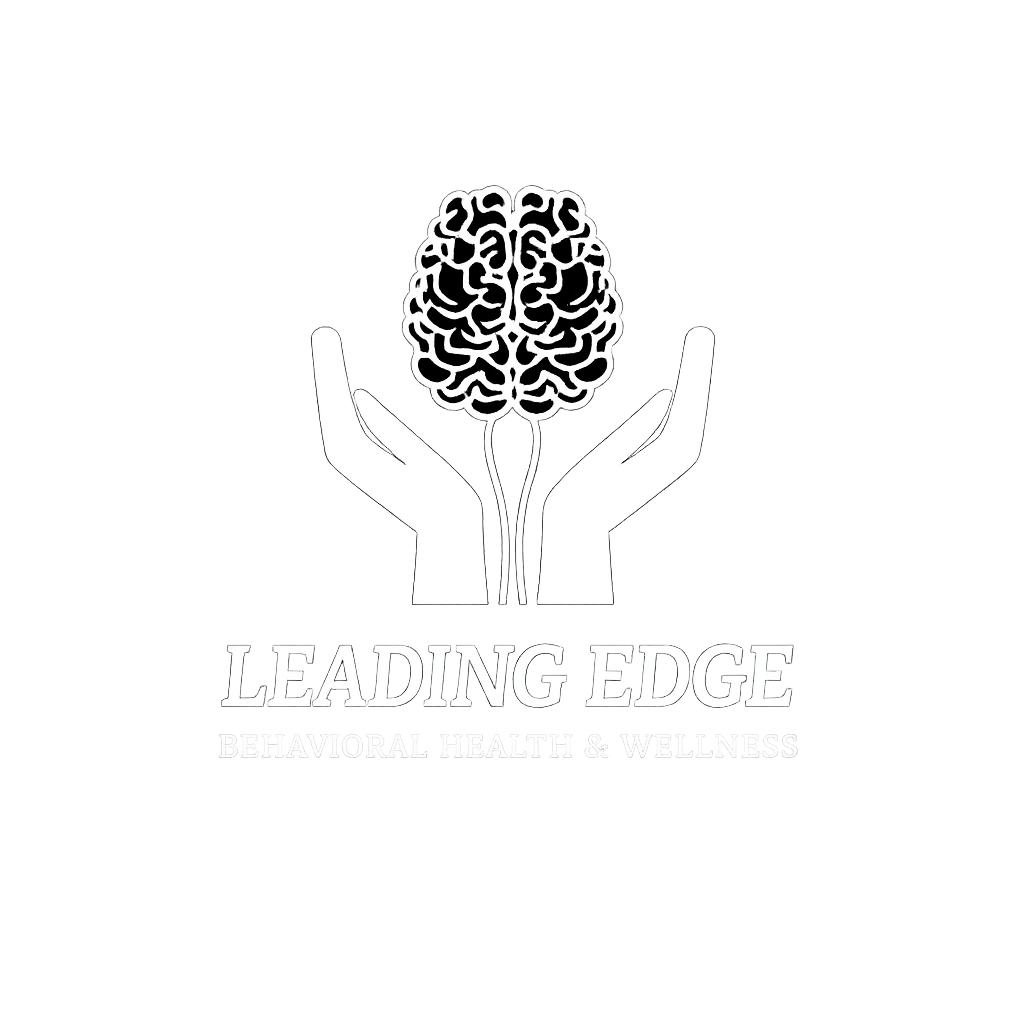Anxiety and depression can make life seem lonely and scary. But remember, many people share your feelings. You’re not alone. Medical treatment, along with counseling or specific life approach adjustments, helps millions of people experience relief from their mental health struggles.
We will talk about “what are the top 10 medications for anxiety and depression?”, how they work, and answer questions like “can mood stabilizers help anxiety?” or “who prescribes anxiety medication?”.
We’ll also cover exceptional cases, like the best anti-anxiety medication for the elderly, and clear up myths like “can I use Benadryl for anxiety?”. Let’s get started!
Leading Edge Behavioral Health and Wellness specializes in anxiety and depression care. We provide tailored therapy and effective treatments. Reach out to us today.
Understanding Anxiety and Depression
Anxiety and depression represent conditions that exceed the standard emotions of depression or agitation. They are complex medical conditions that reshape how your brain functions. Medications can balance brain chemicals like serotonin and adrenaline. This careful mix may boost your mood and ease your fear. Yet, not every pill suits every individual. Finding the perfect remedy takes time and a collaborative journey with your doctor.
What Are the Top 10 Medications for Anxiety and Depression?
The following list provides the most standard medications used for these conditions. People must consult a doctor prior to beginning any medical intervention.
-
Prozac
Prozac is an SSRI that balances mood. Serotonin helps balance your emotions. The substance works to oppose both depression and anxiety. The medication might cause minor side effects, but these typically remain mild. Nausea combined with sleep disturbances may appear as side effects.
-
Zoloft
Zoloft stands as the essential medication within the SSRI group to treat depression and anxiety symptoms. Zoloft serves as a dependable medicine to overcome panic attacks while reducing social anxiety.
-
Lexapro
Lexapro is a gentle giant among SSRIs. It’s great for newcomers. Its mild nature makes it a smart choice for older adults. This helps minimize unwanted effects.
-
Celexa
Celexa elevates serotonin levels, targeting the twin foes of depression and GAD. It’s a reliable companion on the journey toward emotional wellness.
-
Effexor
Effexor operates as an SNRI, engaging two key brain chemicals. This dual action helps some individuals experience relief faster than the speed of thought.
-
Cymbalta
The drug Cymbalta belongs to the SNRI category, similar to Effexor. The medication links pain that lasts for an extended period with emotional suffering. The medication helps clear the mental fog that blocks physical perception.
-
Xanax
Xanax is a fast-acting benzodiazepine. It’s great for short-term panic attacks. However, using it in the long term can be risky. So, caution is essential.
-
Buspar
Buspar is non-addictive and helps with generalized anxiety. Some doctors combine Prozac and Buspar for anxiety to boost results.
-
Remeron
Remeron helps with sleep and appetite. It’s great for people whose depression has affected these essential parts of life. It’s a comforting touchstone during tough times.
-
Propranolol
Propranolol is not just any SSRI. It’s your quiet protector against anxiety. It eases those shaky hands that tremble with doubt. With its calming effects, you can face the day with fresh confidence.
Can Mood Stabilizers Help Anxiety?
The primary utilization of medications known as mood stabilizers includes Lithium or Lamictal, targeting bipolar disorder treatment. Some doctors give mood stabilizers for severe anxiety when different therapies prove ineffective. The prescribed medication can help stabilize extreme mood swings when anxiety produces them. Always ask your doctor, “Can mood stabilizers help anxiety in my case?”
Who Prescribes Anxiety Medication? Let’s Break It Down
Numerous individuals ponder, “Can my regular doctor prescribe anxiety medication?” or “What doctors can prescribe anxiety medication?”. Here’s the lowdown:
-
Primary Care Doctors
Depression and anxiety medicines that most patients need can be prescribed by your family doctor. They’re a significant first step!
-
Psychiatrists
These specialists handle complex mental health cases. They might adjust doses or combine medications.
-
Neurologists
Can neurologists prescribe anxiety medication? Absolutely! Anxiety often appears with neurological issues, like epilepsy or migraines.
SSRI or Benzodiazepine: Which Is Safer?
The medicine Prozac belongs to the SSRI class of drugs, yet Xanax functions as a benzodiazepine medication.
- SSRIs: Take 4–6 weeks to work, but are safer for long-term use. They’re often the first choice for anxiety and depression.
- Benzodiazepines: Work within minutes but risk addiction. They’re best for emergencies, like panic attacks.
Doctors usually recommend SSRIs first. Healthcare professionals reserve benzodiazepines exclusively for short-term use as a last treatment option.
Beta Blockers vs SSRI: How Do They Compare?
Beta-blockers represented by Propranolol, and SSRIs function as different medication classes.
- Beta Blockers: Stop physical symptoms (e.g., sweating, fast heartbeat). They’re great for stage fright or public speaking.
- SSRIs: They uplift your spirits slowly, harmonizing serotonin like a symphony.
Some combine forces! A beta-blocker delivers an immediate calming effect, but an SSRI supports sustained wellness development.
Can I Use Benadryl for Anxiety? The Truth
Benadryl, the sleep-inducing ally in your allergy battle, often brings sweet slumber. For some, it’s a drowsy embrace that can temporarily soothe anxiety’s sharp edges. Yet, it’s not a long-term remedy, just a fleeting reprieve. Beware, as side effects—dizziness and confusion—can stir up more unease. Always consult your doctor before making Benadryl your go-to overprescribed treatment.
Exceptional Cases: Customizing Treatment to Your Needs
-
Best Anti-Anxiety Medication for the Elderly
Older adults need gentle options. Lexapro and Zoloft are popular choices. They are less likely to interact with other medications. Also, they usually do not cause falls.
-
Cyproheptadine and Depression: An Unusual Pair
Cyproheptadine is an allergy drug. Some studies say it might help with depression linked to a poor appetite. Still, this is rare and not FDA approved.
-
What If My Medication Isn’t Working?
Tell your doctor! They might adjust your dose, switch medications, or add therapy. Patience is key—it can take weeks to see changes.
Lifestyle Tips to Support Your Medication
Medications work best when paired with healthy habits:
- Talk to Someone: Therapy or support groups can help you feel understood.
- Move Your Body: A quick walk can lift your mood.
- Eat and Sleep Well: A balanced diet and 7–9 hours of sleep help.
Final Thoughts: What Are the Top 10 Medications for Anxiety and Depression?
The complete list of the top ten medications used for anxiety and depression treatment does not exist. A doctor creates your treatment approach by considering both your health status and personal routines in addition to your condition and symptoms. Always ask questions like:
- “Can mood stabilizers help anxiety if SSRIs aren’t effective?
- “Is a beta blocker vs an SSRI better for my physical symptoms?”
Remember:
- Keep your doctor updated about side effects.
- Never quit medication suddenly—it can be dangerous.
- Celebrate small wins! Healing takes time.
FAQs
Do older adults take the same medicines?
Older adults often get gentler pills (like Lexapro) to avoid side effects. Safety first!
Do I need therapy if I take medicine?
Medicine works best with therapy or talking to someone. It’s like teamwork for your brain!



